Wolverines, primarily carnivorous mammals, have a diet that includes a wide variety of foods. They eat smaller animals such as rabbits and rodents, large ungulates like moose and caribou (often as carrion), and birds. In addition, Wolverines also supplement their diet with berries and insects when available, displaying impressive adaptability to their harsh environments.
Wolverines are not fussy eaters – they chomp down anything from small rodents to large ungulates, from succulent berries to insects. Their eclectic menu is a key to their survival.
But what do Wolverines eat the most? Read this blog to explore the complete diet of Wolverines. We will also delve into the intriguing eating habits of Wolverines, discovering what they consume and how they adapt their meals to their environment.
Is Wolverine A Carnivore or Omnivore?
Predominantly, Wolverines are carnivorous, a term that refers to animals that feed on other animals. However, their diet extends beyond just meat, showing a fascinating degree of flexibility that allows them to survive in harsh habitats.
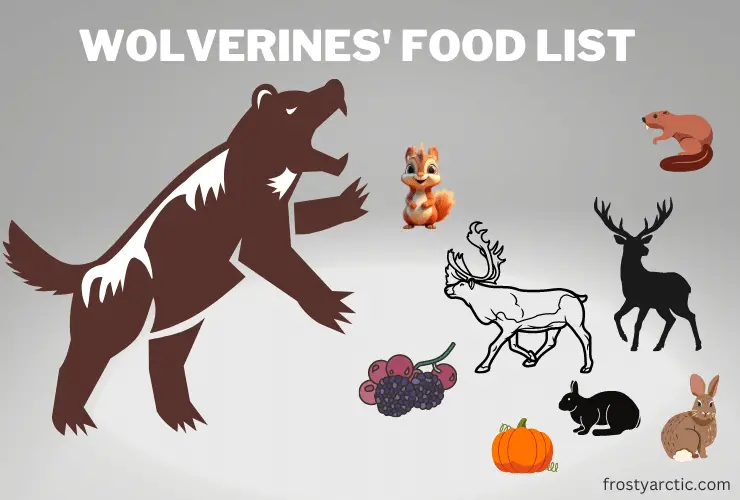
Wolverines: The Opportunistic Carnivores
Wolverines belong to the weasel family, Mustelidae, which includes some of the most formidable meat-eaters in the animal kingdom, like otters, badgers, and minks. Their diet mainly consists of meat, which they get from hunting or scavenging.
They are considered ‘opportunistic’ carnivores, meaning they’ll take advantage of whatever food sources they get.
Omnivorous Tendencies
Despite being primarily carnivorous, wolverines have also been observed consuming non-animal food sources. They occasionally eat plant materials when meat is scarce, demonstrating an opportunistic and adaptable approach to their diet. ~ Source
What Foods Does Wolverine Eat?
Despite primarily being carnivorous, the wolverine’s diet is diverse and opportunistic. It includes a variety of small to large animals, carrion, and occasionally plant material, depending on the season and availability.
Small Animals
The menu includes smaller mammals like
- Squirrels
- Beavers
- Rabbits
- Mountain hares
- Grouse
- Small rodents.
Wolverines have been known to hunt or scavenge these animals for their nutritional needs.
Large Animals
Wolverines can also take down larger prey, like
- Deer
- Caribou
- Moose
- Reindeer
They often exploit weakened or injured individuals.
Birds
Birds and their eggs also make up part of a wolverine’s diet. They are known to climb trees and cliffs to raid birds’ nests. ~ Source
Berries and Plants
Wolverines have been observed foraging for berries and other plant foods. These plant-based foods can help supplement their diet when meat is less available. ~ Source
What Do Wolverines Eat the Most?
Predominantly, Wolverines thrive on a protein-rich diet, obtaining most of their nutrients from consuming meat.
Large Mammal Carrion
According to an article published in Acta Theriologica, most of a wolverine’s diet often consists of carrion – the remains of large ungulates like moose, caribou, elk, mountain sheep, mountain goats, and deer.
Small to Medium Mammals
Another article published in Polar Research suggests that Wolverines also frequently consume smaller mammals such as beavers, porcupines, and rabbits. Being easier to catch, these creatures make up a significant portion of the Wolverine’s diet.
Seasonal Variations in the Diet of Wolverines
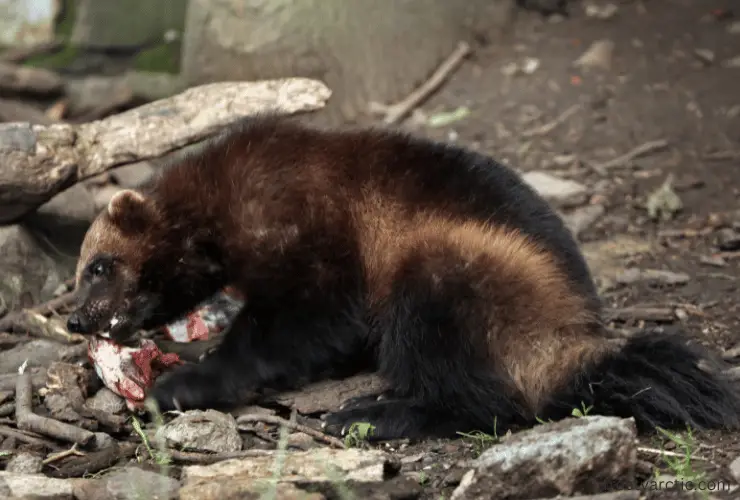
Like many other animals, the diet of Wolverines varies with the changing seasons.
Summer Diet
During the summer months, the Wolverines have a diverse diet. Based on a study conducted in Arctic Alaska, the summer diet of Wolverines consists of a variety of small mammals, birds, insects, and berries. This is likely due to the increased availability of these food sources during the warmer months.
● Small mammals
Small mammals, including ground squirrels, marmots, mice, and voles, make up a substantial portion of the Wolverine’s summer diet. These animals are more active and plentiful during the summer, providing an abundant food source for Wolverines.
● Birds and Eggs
Birds and their eggs are another common food source for Wolverines in the summer. As discussed above, Wolverines are opportunistic feeders and will feed on bird nests that are easily accessible.
● Insects
Although not a significant part of the Wolverine diet, insects are also consumed during summer. Wolverines have been observed eating beetles and other insects, likely as an additional source of protein.
● Berries
When plant foods become available during the warmer months, Wolverines supplement their diet with berries and other plant matter. Although this is a small fraction of their diet compared to meat, it shows their adaptability to seasonal changes.
Winter Diet
In contrast to the summer, the winter diet of Wolverines primarily comprises large ungulates, specifically caribou, deer, and moose. The shift in diet is likely due to the scarcity of smaller prey during the harsh winter months.
● Caribou
Caribou is a significant part of the Wolverine’s winter diet. Wolverines often feed on the carcasses of caribou that have died due to the harsh winter conditions. They are also known to hunt weak or injured caribou actively.
● Moose
Although less common than caribou, moose are also a part of the wolverine’s winter diet. Like caribou, Wolverines feed on moose carcasses and may also hunt weak or injured moose.
● Deer
Wolverines also rely heavily on deer as a primary food source in winter. The cold, harsh conditions of the season tend to result in a higher mortality rate among deer, especially the young, old, or sick ones. Wolverines, the opportunistic feeders, take advantage of this natural phenomenon. When hunting is not feasible, they turn to scavenging deer carcasses. ~ Source
How Much Does a Wolverine Eat a Day?
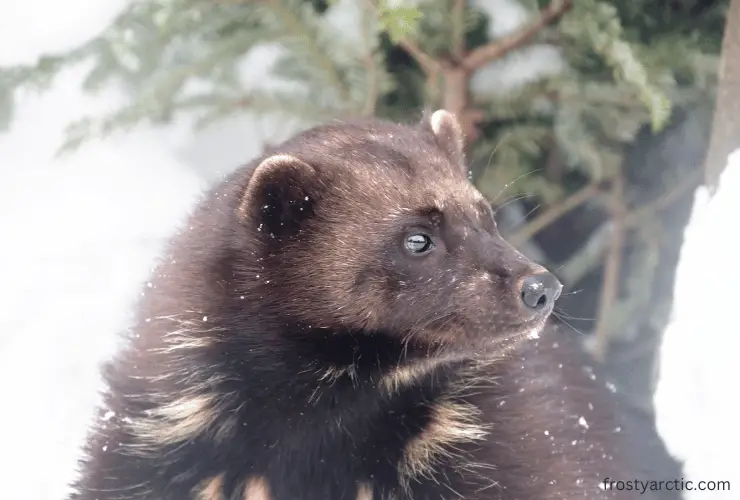
Wolverines, known for their strength and resilience, are hardy animals with substantial dietary needs to match. They have a high metabolic rate which necessitates a significant food intake.
Scientific studies have estimated that a male wolverine needs about 5096 kilojoules (kJ) of energy daily, while a female requires around 3645 kJ. To put it in perspective, over a year, a male wolverine’s energy requirement totals nearly 1.9 million kJ.
That’s roughly the energy content of about eight mule deer! For female wolverines, the annual energy need is about 1.4 million kJ, equivalent to consuming less than six mule deer annually.
Note: the daily consumption of a wolverine varies widely and is influenced by factors such as season, food availability, and the energy requirements of the individual animal.
How Does Wolverine Eat?
Wolverines are adept hunters, utilizing a variety of techniques to catch their prey.
● Stalking and Ambushing
They are patient predators, capable of stalking their prey for extended periods before launching a surprise attack. This tactic is often employed when hunting smaller mammals and birds.
● Endurance Hunting
Despite their compact size, Wolverines can exhibit endurance hunting behavior, where they persistently chase their prey over long distances, ultimately wearing the prey down.
Scavenging Skills
Wolverines are typically more prone to scavenging than hunting, often relying on other meat-eating creatures like wolves to kill prey for them. The remains from a meal consumed by wolves can be pretty substantial, providing ample food for a Wolverine.
They haul remnants away from large prey like moose and caribou. Since they heavily rely on scavenging from the remains of large animals, they’ve adapted to go for extended periods without food. When other food sources aren’t readily available, they’ll return to old meals to eat the frozen bones and hides. ~ Source
Did you know? Wolverines can cover incredible distances, up to 15 miles a day, in their search for food. They’re gifted with an incredible sense of smell, strong enough to detect a deceased deer hidden six feet beneath the snow!
Also, their large feet help them walk on snow and dig up their meals. Their jaw muscles are so powerful that they can quickly break down frozen meat and bones. Remarkable, isn’t it? ~ Source
Can Wolverine Survive Hunger?
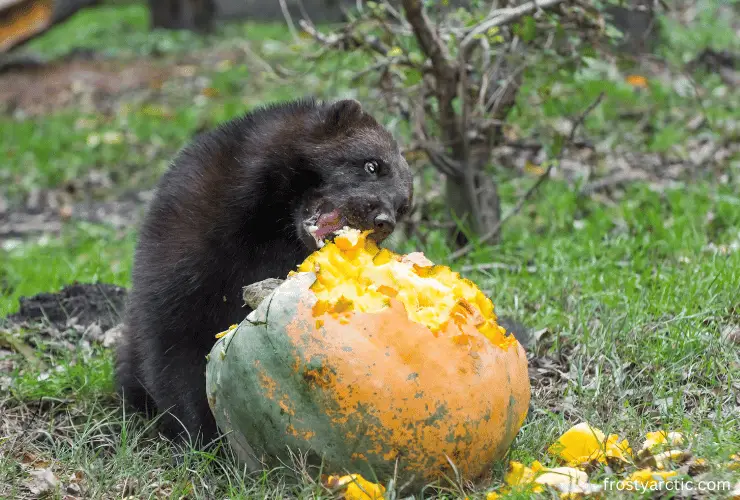
Wolverines, with their remarkable adaptations and survival strategies, are built to withstand periods of food scarcity. Their ability to survive hunger comes from several key biological and behavioral factors.
Physiological Adaptations
● Feasting and Fasting
A wolverine’s body is adapted to handle periods of feasting when food is plentiful, followed by periods of fasting when food is scarce. This feast and fast cycle is a common survival strategy among many carnivores living in harsh environments.
● Metabolic Adaptability
Wolverines have a high metabolic rate, but they also have the ability to slow it down during periods of food shortage. This metabolic flexibility helps them conserve energy during times of scarcity.
● Fat Storage
Wolverines can store excess fat from their food intake. This fat reserve provides an energy source during periods of food scarcity, enabling them to survive prolonged periods without eating.
Behavioral Adaptations
Behavioral strategies also play a vital role in a wolverine’s ability to survive hunger.
● Food Caching
Wolverines have developed a unique method to preserve their food by creating caches. After a successful hunt or find, they often hide surplus food in the snow, using it as a natural refrigerator. These caches provide a lifeline when food is scarce or during harsh weather conditions when hunting or scavenging is difficult.
● Territorial Behavior
Wolverines have sizeable home ranges that they defend fiercely. These can be vast – ranging from 200 to 260 square miles for males and approximately 115 square miles for females. This large territory increases their chances of finding food, whether through hunting or scavenging. ~ Source
FAQ
Q: What do Wolverines eat in the tundra?
A: In the tundra, Wolverines feed on a variety of prey, including caribou, hares, rodents, and birds. They also scavenge on carcasses left by other predators.
Q: How do Wolverines protect their food?
A: Wolverines fiercely protect their food, even from formidable creatures like wolves and bears. They rely on their robust bodies, ultra-sharp teeth, and powerful jaws for defense. Plus, they have a unique strategy of releasing unpleasant odors from their anal glands to deter others from their food store.
Q: Do Wolverines eat wolves?
A: Wolverines generally don’t hunt wolves but may scavenge from wolf kills.
Q: Do Wolverines eat frogs?
A: Yes! Wolverines can eat frogs, given their opportunistic nature and diverse diet.
Q: Do Wolverines eat deer?
A: Yes! Wolverines are known to consume deer, either by hunting weak ones or scavenging carcasses.
Q: Do Wolverines eat grass?
A: No! Wolverines are primarily carnivores and don’t typically consume grass.
Q: Do Wolverines eat owls?
A: Wolverines are not known for hunting owls but may eat one if the opportunity arises.
Q: Do Wolverines eat Wolverines?
A: It’s rare, but in harsh conditions, Wolverines sometimes resort to cannibalism.
Q: Do Wolverines eat fruit?
A: While primarily carnivorous, Wolverines might occasionally eat fruits when other food sources are scarce.
Conclusion
So, “What do Wolverines eat?” As we discussed, the wolverine’s diet is robust and versatile. Their menu ranges from various animals – hunted or scavenged, to occasional plant matter when it’s in season.
They use their sharp claws and powerful jaws to catch smaller prey when hunting. They even utilize the leftovers from other predators, extracting valuable nutrients from remains that many animals would disregard.
The amount a wolverine eats in a day can vary greatly. They are opportunistic feeders, often consuming large quantities when food is available and enduring periods of fasting when it’s not. This adaptability to changing food availability is a testament to the Wolverine’s resilience and survival skills.

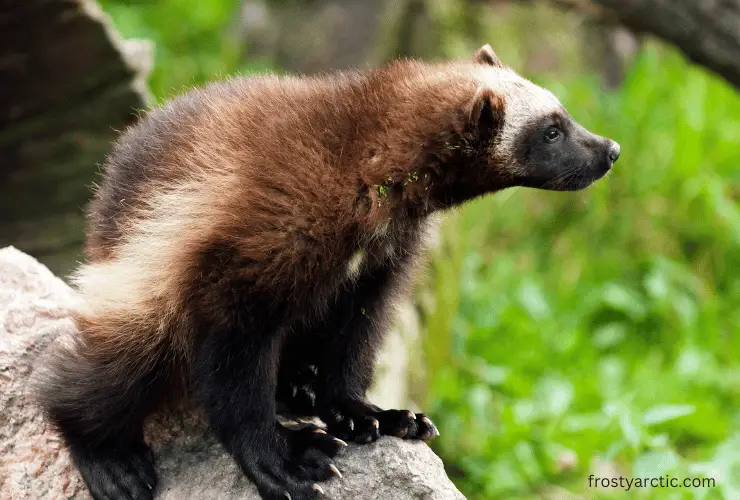

2 thoughts on “What Do Wolverines Eat? [Complete Diet]”